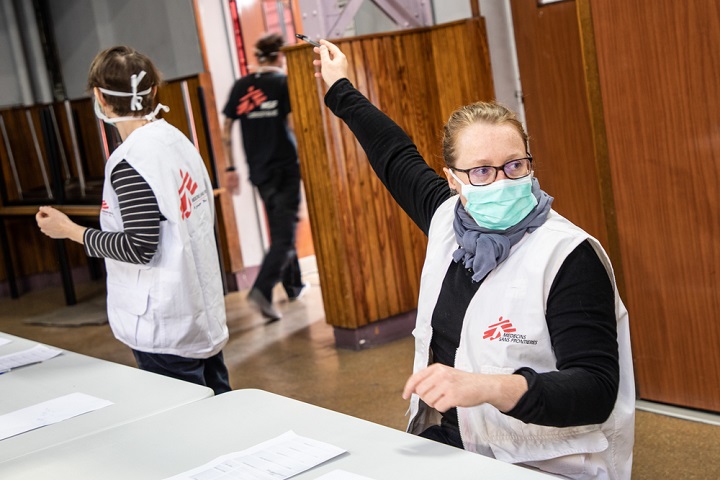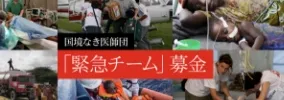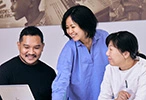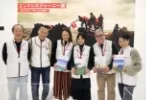事務局からのお知らせ
新型コロナウイルス感染症への対応拡大に伴う、医師・専門スタッフ急募のお知らせ
2020年04月01日国境なき医師団は、新型コロナウイルス感染症の世界的流行を受け、各地で緊急医療援助活動を行っています。活動の拡大に伴い、下記職種の医師・専門スタッフを急募しています。なお、通常の海外派遣スタッフ採用活動も継続しています。
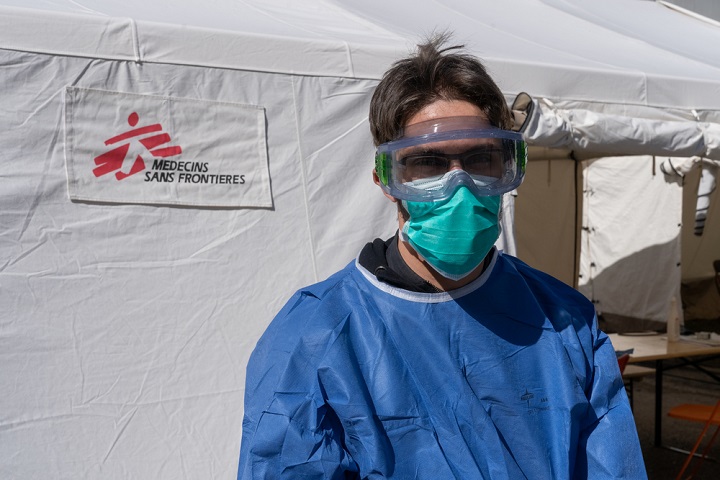
急募中の職種:
1: 救急専門医
2: 集中治療専門医
3: 医療機器専門家(スペシャリスト・ロジスティシャン)
4: 水・衛生専門家(スペシャリスト・ロジスティシャン)
各職種に関する情報は、下記および国境なき医師団人材募集ページからご確認ください。
*世界各地で移動の制限がある影響で、採用後すぐに活動地へ派遣されるとは限りません 。
*応募方法は通常と同様です。このページよりご応募ください。
*応募にあたっては、集中治療専門医は救急医と同様の書類をご提出ください。また、医療機器専門家と水・衛生専門家は、ロジスティシャンと同様の書類をご提出ください。
■応募はこちらから
■お問い合わせ:recruit@tokyo.msf.org
急募中の職種について
詳細は下の英文Recruitment Detailsおよび国境なき医師団人材募集ページをご覧ください。
1: 救急専門医
救急チームのリーダーとして、緊急活動の計画、組織体制づくり、評価を担当し、救急部門に従事するスタッフの監督やサポートを行います。
■応募条件
・救急専門医
・救急部門での豊富な経験
・英語でのコミュニケーション力
■派遣期間:3~6カ月
2: 集中治療専門医
集中治療室に限らず、小児科病棟を含めあらゆる科の重篤患者を担当します。質の高いケアを提供することを目的に、病棟を含め、手術室、救急室、検査室などあらゆる他部署との連携のもと業務を進めます。
■応募条件
・集中治療専門医
・集中治療室での豊富な経験
・優れた臨床スキル、乏しい物資の中でも対応・適応できる能力
・小児科を含めあらゆる科への対応能力
・英語でのコミュニケーション力
■派遣期間:1~6カ月
3: 医療機器専門家(スペシャリスト・ロジスティシャン)
MSFの医療施設で使用される医療機器の管理を担当し、医療機器の設置と起動の確認、保守、監視、修理などを行います。また、機器を使用する医療スタッフへの指導、サポート、メンテナンス記録のフォローや、保守管理システムの管理なども担います。
■応募条件
・臨床工学士、または電気や機械系の学士(または同等の資格や経験)
・関連分野での2年以上の経験(特に電子機械や電気機器の維持管理経験は必須)
・英語のコミュニケーション力
■派遣期間:6カ月以上
4: 水・衛生専門家(スペシャリスト・ロジスティシャン)
医療施設への良質な水の供給のほか、医療施設の衛生管理、媒介虫駆除管理、シャワーやトイレなどの設置、下水処理・医療廃棄物処理の設備管理などを担います。
■応募条件
・水工学の学位保持者、水処理の専門家、地質学者、水文地質学者、修理技術者、または関連する分野の技術資格保持者
・関連分野での2年以上の経験
・英語でのコミュニケーション力
■派遣期間:6カ月以上
Recruitment Details
1: Emergency Doctor
Several MSF missions specifically need emergency doctors. The emergency doctors are activity managers responsible for planning, organizing and evaluating the emergency activities. They supervise and provide support to the emergency doctors and midwives. They ensure good collaboration with other services and report on the activity of their service. MSF's emergency services have continued to grow since 2011. We are currently focused on developing emergency structures. Because of its versatility and flexibility, emergency medicine is used more and more in war contexts as well as long-term projects.
Activities:
They have "On Call" duty to ensure 24-hour service.
They provide medical care to severely ill / injured patients in conflict, post-conflict or post-disaster areas, etc.
They contribute to the quality of care in the emergency room in the hospital according to the MSF protocols and guidelines. They take part in the emergency response (eg. influx of wounded, epidemics ...).
Clinical:
• Ensures daily consultations in the emergency room, resuscitation or dressing room.
• Ensures and monitors the good functioning of the triage.
• Ensures that doctors administer prescriptions according to MSF protocols and guidelines.
• Ensures that emergency patient's files are complete, and that medical recommendations are clearly communicated to nurses.
• Uses the emergency resources (radiology and blood bank) rationally.
• Identifies appropriate patients to refer to other medical facilities.
Data collection:
• Ensures the collection of medical data.
• Participates in the drafting and analysis of morbidity-mortality reports with the Medical Team Leader and / or the hospital director or the project coordinator.
Collaboration with other services:
• Participates in medical meetings.
• Works in close collaboration with the intensive care unit, the operating theater and the delivery room in case of emergency.
• Gives support to other services if needed.
Coaching/training:
• Provides supervision and supports ongoing training of the team based on MSF guidelines and protocols.
• Support existing training programs like Basic First Aid
They ensure the respect of medical confidentiality in all areas of their activity.
PROFILE
DIPLOMA
• doctorate in medicine with significant experience in the emergency department
• current matriculation in Medical Council/Board
AVAILABILITY
• 3 to 6 months
LANGUAGES
• intermediate English is required because a significant portion of our missions are English-speaking. The minimum level of English required is B1 on the CECREL grid
SKILLS
• good clinical skills
• strong interest in coaching, training and skills transfer
• able to work in multicultural and multidisciplinary teams in contexts that are often complex and isolated, requiring strict respect for the local culture and security rules in force
2: ICU Doctor
Several MSF missions specifically need intensivists.
They are in charge of patients in severe or unstable condition.
Their skills may be needed for hospitalized patients in the intensive care unit, or in other areas: emergencies, surgical or medical services, pediatrics, etc. They are basically there for the management of any vital distress.
They work in close collaboration with the teams of medical or surgical services concerned (anesthesia, surgery, emergencies, pediatrics ...) as well as with the personnel in charge of paramedical activities (laboratory, blood bank, etc.).
Their work is done under the supervision of the medical team leader of the project, the medical coordination of the country, the cell and the medical department of the headquarters.
The development of intensive care at MSF is a changing and developing project, constantly seeking to improve oversight, with the aim of ensuring quality care. The amount of human and material resources required for intensive care is justified by the large number of serious patients MSF treats.
These intensive care units are integrated into medical and/or surgical hospitals and are part of either specialized programs (cardiology, burn units) or general hospitals (access to care in conflict zones or for refugees).
Activities
The Intensivist may take on numerous roles:
• Medical care and monitoring of patients hospitalized in intensive care, in accordance with MSF protocols.
• On certain missions, by bringing a specific competence to a particular project. Ex: management of severe sepsis in an intensive care burn unit, optimization of the management of cardiogenic shock in a cardiac intensive care unit ...
They have "On Call" duty to ensure 24-hour service.
They ensure the respect of medical confidentiality in all areas of their activity.
Clinical:
Their clinical activity is carried out based on protocols validated by MSF.
MSF intensive care units typically include:
• hemodynamic (noninvasive) and close respiratory monitoring,
• administration of drugs with the electric syringe (antibiotherapy, insulin, heparin, catecholamines, ...
• large pharmacy,
• use of basic laboratory tests (and sometimes bacteriological tests), radiology or portable ultrasound, blood bank (no ventilation or invasive monitoring, no dialysis, etc.)
Their clinical activity is ensured by:
• multiple visits per day of adult or pediatric intensive care patients,
• caring for unstable or serious patients in emergency or other services,
• optimal coordination of the management of surgical patients with the anesthesia and surgery team,
• making recommendations in their particular field of expertise: antibiotic therapy, hemodynamics ...
• identifying patients to refer to other medical facilities.
Collaboration with other services:
• participating in medical meetings,
• working in close collaboration with the emergency department, the operating theater and the hospitalization services (medicine, surgery, pediatrics, maternity ...) in case of emergency and vital distress,
• supporting of other services if needed.
Coaching / Training:
• in collaboration with the various activity managers and in their field of expertise, they provide the supervision and the continuous training of the team (medical and para-medical) exercising in intensive care, emergencies, in the recovery room or in hospital. For this, they rely on protocols and teaching resources validated by MSF (BASIC DHS, ...)
• They support specific training projects (e.g. ultrasound, nutrition, infectiology ...)
Analyze the intensive care activity with the coordination teams in the field and headquarters:
They ensure the collection of quantitative medical data,
• They participate in the drafting and analysis of weekly or monthly morbidity-mortality reports with the referring physician and / or the hospital director or project coordinator.
• They write a detailed end-of-mission report on the positive and negative elements, the difficulties and the areas of improvement identified during the mission.
• They ensure a debriefing to the medical department of the headquarters on their return from the field.
PROFILE
DIPLOMA
• has a doctorate in medicine with significant experience in the critical care unit (CCU) and/or intensive care unit (ICU)
• good clinical skills, able to adapt to low resource settings and a population with multiple medical-surgical pathologies, including pediatrics
• comfortable with technical gests
• current matriculation in Medical Council/Board
AVAILABILITY
• 1 to 6 months
LANGUAGES
• intermediate English is required because a significant portion of our missions are English-speaking. The minimum level of English required is B1 on the CECREL grid
SKILLS
• strong interest in coaching, training and transferring of skills.
• the ability to work in multicultural and multidisciplinary teams in contexts that are often complex and isolated, requiring strict respect for the local culture and security rules in force.
3: Biomedical Specialist (Specialist Logistician)
The biomedical technician is responsible for maintaining biomedical equipment used in MSF's medical facilities. This includes verifying the installation and start-up of medical equipment, maintaining, monitoring and repairing biomedical equipment, supervising, training and supporting users, updating maintenance records and technical documentation and ensuring computerized maintenance management software is effective.
Responsibilities
• Management of the equipment required by the project: procurement, installation, maintenance and supervision of biomedical equipment
• Supervising and training logistics teams and locally employed and/or international personnel.
• Providing logistical support to medical teams,
PROFILE
DIPLOMA
• A diploma in biomedical mechanics
EXPERIENCE
• 2 years working experience
• experience in maintaining automated/electromechanical/electronic systems are mandatory
• supervisory and/or training expertise is a definite plus
AVAILABILITY
• 6 months minimum
LANGUAGES
• English level B1
4: Water, Hygiene and Sanitation Specialist (Specialist Logistician)
The water, hygiene and sanitation (watsan) manager is responsible for ensuring the supply of good quality water to health facilities and/or people deprived of water because of conflict or natural disaster, etc. Liaising with the medical team, the WATSAN manager is responsible for
• hospital hygiene,
• setting up vector disease control,
• building showers and latrines, etc., and
• the infrastructure required to dispose of sewage and clinical waste.
Responsibilities
• Management of the water and sanitation equipment required by the project: procurement, installation, maintenance and supervision of equipment,
• Organisation of the project's watsan infrastructure: small-scale construction and refurbishment works, and other water, hygiene and sanitation activities,
• Supervising and training logistics teams and locally employed and/or international personnel.
• Providing logistical Watsan support to medical teams,
• Working with the medical teams and project coordinator to define the operational strategies and logistical objectives of the project.
PROFILE
EDUCATION
• Diploma in water engineering, specialist in water treatment, geologist, hydrogeologist, repair technician or have other technical qualifications related to this sector of activity.
EXPERIENCE
• 2 years working experience
• supervisory and/or training expertise is a definite plus
AVAILABILITY
• 6 months minimum
LANGUAGES
• English level B1
